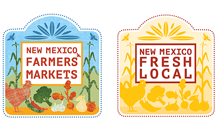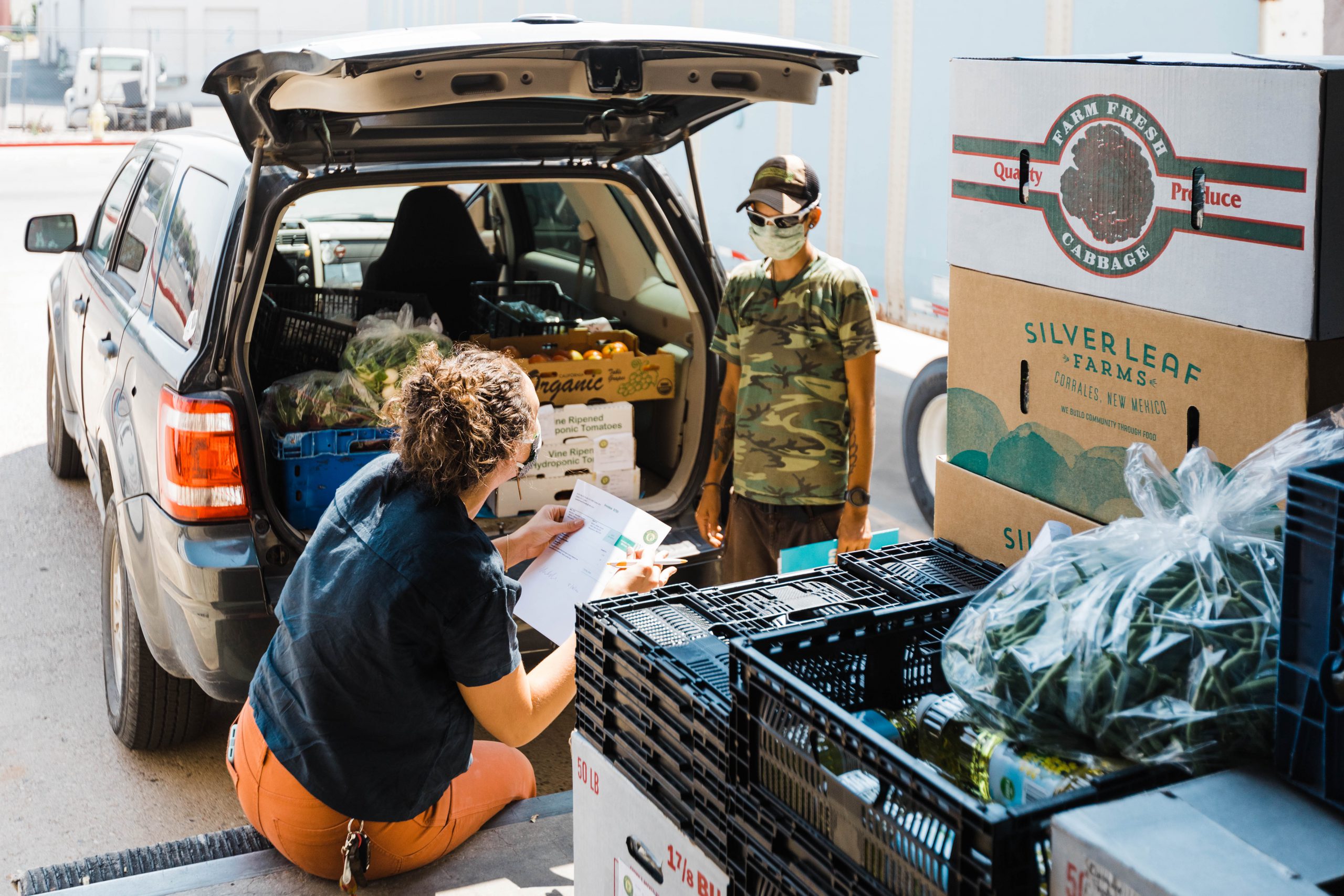
For Albuquerque’s MoGro Mobile Grocery, a nonprofit mobile grocery project and sliding-scale CSA serving vulnerable New Mexico families, the ongoing food access crisis caused by the pandemic is an urgent call-to-action. Armed with $13,000 in grant support from the New Mexico Farmers’ Marketing Association’s (NMFMA) COVID-19 Local Food Supply Chain Response Fund, MoGro has joined forces with Three Sisters Kitchen to provide subsidized bags of locally grown produce to more than 750 families in affected Pueblos and urban communities with limited or no access to fresh, healthy food. Thanks to the NMFMA grant, the CSA is better able to meet the increase in demand due to COVID: “Before COVID we were moving 3,000 pounds of produce a week—and now we’re moving 9,000 a week,” says MoGro Co-Director Josh Norman.
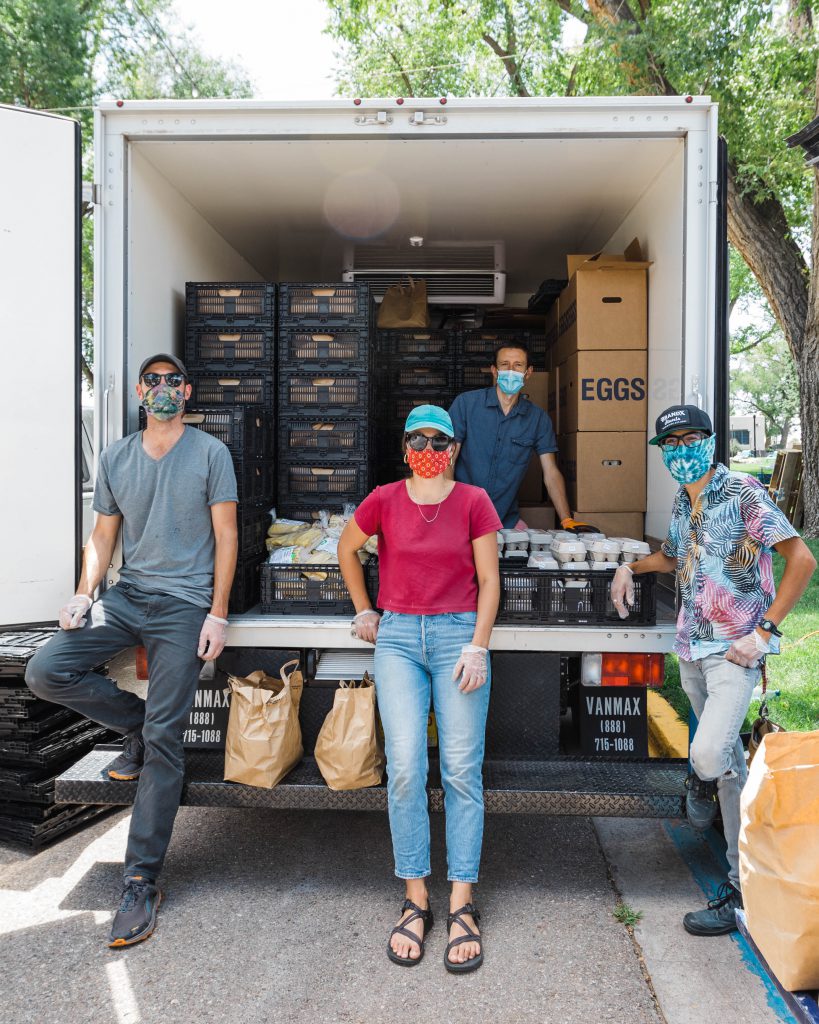
MoGro staff and a volunteer take a quick break from loading donated food boxes into the vehicles of needy families. Left to right: volunteer TC Townsend, Operations Manager Shelby Danilowicz, Director Josh Norman, and Distribution Manager Erik Rott.
The health and economic repercussions of the pandemic have been felt most strongly by families and communities who were already experiencing financial hardship and food insecurity before the arrival of COVID-19; access to fresh, locally grown produce has been especially challenging for these people. This is especially true for Native Americans living on Pueblos and the Navajo Nation, where people have been restricted from leaving their homes or having visitors, and in urban communities where individuals lack access to safe and reliable transportation. These families have had to rely on nutritionally deficient boxed and canned commodity foods.
To assist these communities in need, MoGro is purchasing healthy, nutrient-dense food directly from New Mexico farmers—including several Pueblo-based growers and farmer-owned collaboratives such as AgriCultura Growers’ Network—and distributing bags of produce to families participating in the sliding- scale CSA. While food costs for subsidized bags are mostly covered by the sliding scale, the NMFMA grant funds will cover operational costs like packing supplies, delivery, and labor through December.
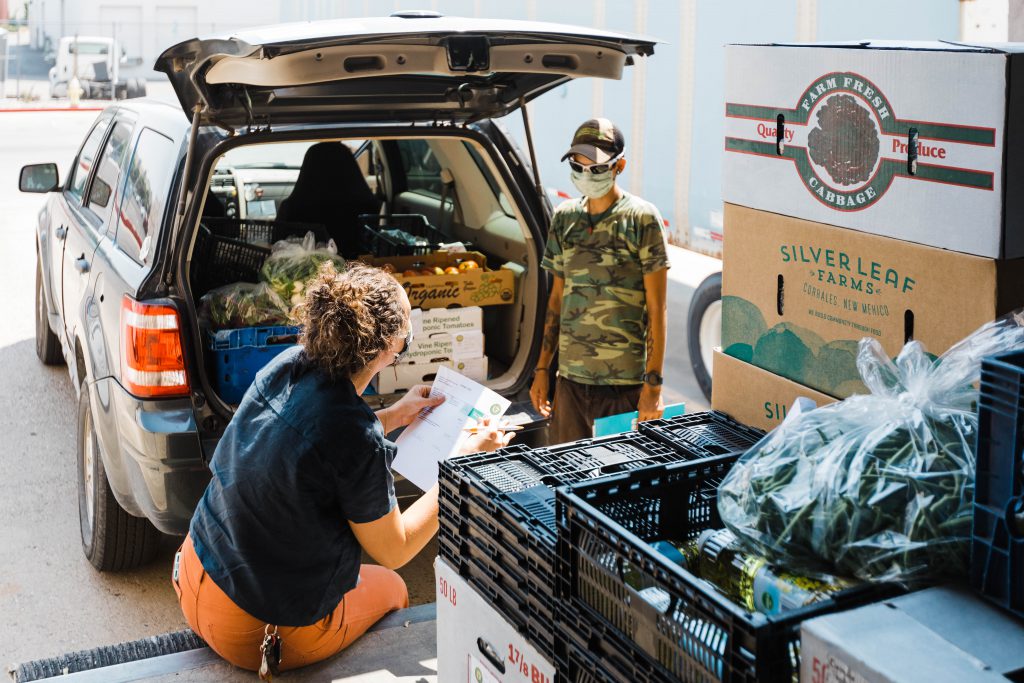
MoGro Operations Manager Shelby Danilowicz receives an order of vegetables from AgriCultura Network, delivered by Ash Abeyta from Vida Verde Farms.
Families place their orders on an as-needed basis and receive produce bags with tomatoes, cucumbers, carrots, and value-added items such as tortillas, cheese, eggs, and more—a 30 dollar value—for as little as 10 dollars. Of the 9,000 pounds of food that MoGro processes each week through the CSA, roughly 1,500 go to the sliding-scale program, supplying approximately 400 food bags per month.
To qualify for the subsidized food bags, families must meet at least one of the project’s criteria: lack of access to safe transportation, limited or no ability to leave their homes or communities due to COVID-19 travel restrictions, inability to afford locally grown produce, or significant loss of wages associated with the pandemic. Those who do not qualify for the subsidized bags can still participate in the CSA by purchasing bags at the full, 30 dollar cost.
MoGro procures the food, packs the bags—each weighing 12-17 pounds—and delivers roughly half of them (about 200 a month) to centralized pick-up locations in Albuquerque, Santa Fe, Española, and Pueblo communities—including Zia, Jemez, and Santa Clara Pueblos. Three Sisters Kitchen delivers the other 200 bags directly to the homes of vulnerable families in the Albuquerque area.
Not only is this helping food-insecure families, it is a lifesaver for farmers who suffered significant income losses when schools and restaurants were forced to shut down because of COVID. Thanks in part to the NMFMA grant CSA supporters, MoGro has contributed close to $50,000 directly to New Mexico producers since the start of the pandemic. “How can we make this last?” asks Norman. “How can we continue to emphasize the importance of food and local food after COVID takes more of a backburner?’”
“For MoGro and Three Sisters Kitchen, deeper, more committed relationships [with farmers and collaborators] have been a silver lining during the pandemic,” says Norman. “In addition to directly supporting both local producers and vulnerable populations, this project will help to further strengthen these relationships.”
For Norman, the deepening relationships and expanding collaborations between local farmers and nonprofit organizations, a process that has been accelerated by the pandemic, will be key to ensuring a resilient food system that prioritizes community needs and the importance of healthy, local food well beyond COVID-19. That’s good news for New Mexico farmers, and it’s also good news for communities in need around the state who are now enjoying healthy, nutrient-dense, locally grown food.
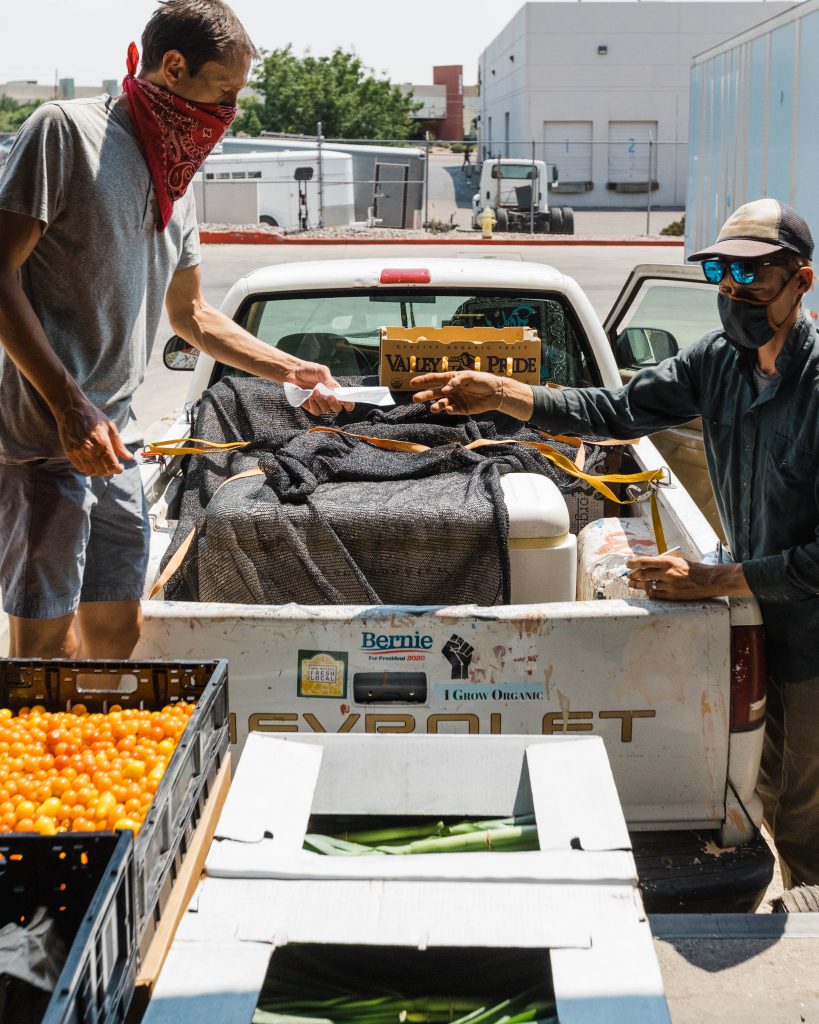
Ian Colburn of Solarpunk Farms, delivers fresh picked cherry tomatoes and cucumbers that will be packed in the MoGro CSA boxes.
This story is part of a series featuring the many farmers, ranchers, nonprofit organizations, and collaborative groups who received grants via the NMFMA’s COVID-19 Local Food Supply Chain Response Fund. The Fund was designed to reduce economic hardship caused by market disruptions linked to the ongoing public health crisis and accelerate a sustained and equitable recovery among farmers and low- income communities. As of mid-September, more than $400,000 has been distributed to 100+ producers and groups. The tireless work and generous spirit of these individuals help solidify New Mexico’s local food system and ensure food access by those in need during an historic, global health crisis. Visit the NMFMA website to learn more and to contribute to the Fund.
By NMFMA Staff | September 2020
